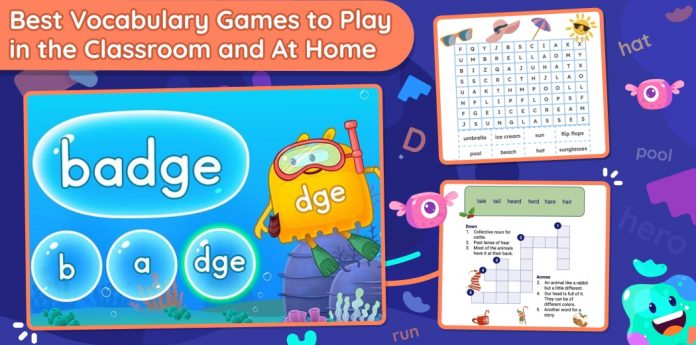Learning new words can help with a child’s cognitive development. Learning new vocabulary impacts different brain areas, leading to a sharp memory. But simple dictation or word cramming will not help kids. It’s beneficial to incorporate fun vocabulary games to capture their interest and facilitate learning. These can be played in the classroom or at home, making learning new words more engaging and enjoyable for children.
Math & ELA | PreK To Grade 5
Kids see fun.
You see real learning outcomes.
Watch your kids fall in love with math & reading through our scientifically designed curriculum.
Parents, try for free Teachers, use for free
A study published by the American Psychological Association shows that games in learning improve children’s participation, emotional involvement, and social skills. Thus, by organizing vocabulary games at home or in the classroom, you can effectively foster the development of your kids’ language skills.
This guide presents easy and educational vocabulary games to enrich kids’ language skills without hassle.
Discover the excitement of learning with SplashLearn’s reading games. Get started on a path to vocabulary mastery!
17 Best Vocabulary Games for Kids (Fun and Educational)
Considering organizing a word game competition? There’s a wealth of vocabulary games available online, as well as offline, that are both entertaining and educational. Based on our research, here are some of the best vocabulary word games for children, suitable for use in classrooms or at home:
8 Vocabulary Games to Play at Home
1. SplashLearn Online Vocabulary Games
Age: 2 to 11 years
SplashLearn offers interactive vocabulary games online for kids where they learn new words through activities focused on word recognition, spelling, and sentence usage. Designed to build a strong foundation, SplashLearn gradually introduces kids to the essentials, starting from letters and phonics all the way to vocabulary building and crafting sentences. This approach ensures a comprehensive understanding, enabling young learners to understand and use new vocabulary in context effectively.
How to Play:
- Initially, sit with your child to explore the SplashLearn platform. Show them how to navigate the games and encourage them to express what interests them.
- Discuss and set daily targets for new words to learn, making each session goal-oriented and rewarding.
- Actively participate by asking about new words. For example, “What new word did you learn?” or “Can you use that word in a sentence?” This reinforces their learning and shows your interest in their progress.
Here are some vocabulary games that you can get started with:
2. Word Search
Material Required: A word search puzzle sheet
Age: 8 to 15 years
Depending upon your kid’s reading and writing levels, download a word search sheet online and give them each copy to find the words.
How to Play:
- Find all hidden words in the grid.
- Highlight or circle found words.
- Complete the puzzle to find every listed word.
Rules:
- Make sure everyone understands they are to find the words listed on their sheet within the puzzle grid. Words can be oriented in any direction.
Rewards: Upon successfully finding all the words, the child earns a colorful certificate of achievement, celebrating their sharp observation and vocabulary skills.
Here are some printable word search worksheets that you can use:
3. Crossword
Material Required: A crossword sheet
Age: 10 to 15 years
When you need some quiet time to focus on household tasks or work, have your kids play a crossword game. Download a crossword sheet online and challenge them to complete it.
How to Play:
- Fill in the crossword puzzle using the given clues.
- Solve the puzzle within 20 minutes.
Rules:
- Only use the provided clues to fill in the words.
Rewards: A sticker for each correctly guessed word.
Get started with these easy-to-download crossword worksheets featuring engaging visuals: a spooky Halloween theme, colorful crispy food illustrations, and beautiful autumn homophones, helping kids enhance vocabulary, practice spelling, and learn homophone.
4. Word Sorting Game
Material Required: Word sorting worksheet, timer (optional)
Age: 6 to 12 years
When you’re looking for a creative way to keep your kids engaged, try a word sorting worksheet. This activity not only keeps them occupied but also enhances their vocabulary and categorization skills.
How to play:
- Download age-appropriate word sorting worksheet.
- Challenge kids to sort words quickly; use a timer for added fun.
- For multiple kids, make it a race for accuracy and speed.
Rules:
- Sort words into categories as quickly and accurately as possible. If playing with multiple kids, turn it into a race.
Rewards: Choose a fitting reward to motivate and recognize their efforts.
Here are some engaging printable word sorting worksheets to kickstart this fun vocabulary game:
5. Basketball Vocabulary
Material Required: A ball and trash can
Age: 5 to 10 years
This game is a fun way to exercise both your brain and arm muscles. It’s great for young kids to learn and stay active.
How to Play:
- Set up a trash can as a makeshift basketball hoop.
- Write several words on a piece of paper or a board.
- Take turns trying to throw the ball into the trash can.
- If you make the basket, choose a word to define. If not, a word is chosen for you.
Rules:
Rewards: Offer rewards for correctly defining words, encouraging both physical activity and learning.
6. Headbanz
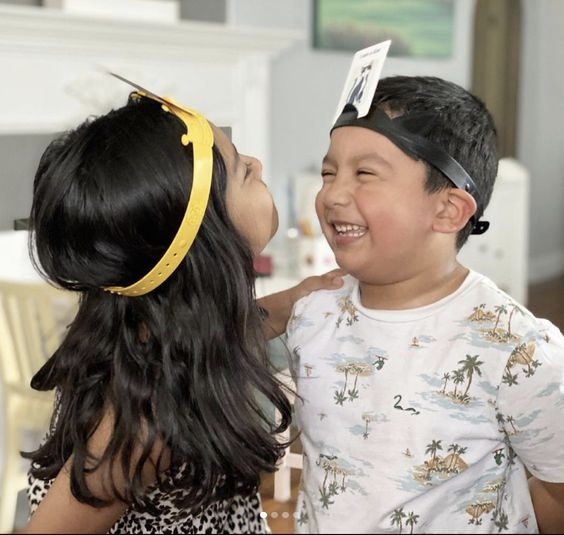
Material Required: Waste hairbands, sticky notes
Age: 4 to 8 years
This is a DIY word game that’s great for playing with your child. First, you must get some hairbands and put a sticky note on them with a food item’s name.
How to Play:
- Place a Headbanz on your child’s forehead without showing them the word.
- Let your child ask yes or no questions to guess the food item.
Rules:
- Limit the number of questions to make it challenging.
Reward: If they guess correctly, they get a small treat related to the guessed food item.
7. Word Pyramid
Material Required: Pyramid worksheet
Age: 6 to 14 years
This game is designed for a single child to enhance vocabulary and critical thinking skills. Download the ELA pyramid worksheet and get ready for some educational fun with your child!
How to Play:
- Sit with your child and help them draw a pyramid, adding six categories in three rows.
- You give clues related to each category, and your child guesses the correct category.
Rules:
- Make the game time-bound to add a sense of challenge.
Reward: Offer a small prize or privilege for each correct guess or for completing the pyramid.
Here are some fun word pyramid-building worksheets to enhance your kid’s vocabulary:
8. Rolling Words
Material Required: A dice and word cards
Age: 10 to 16 years
You need to order some word cards to play this game and make it appropriate to your kid’s vocabulary level. Then, roll the dice to improve your child’s vocabulary.
How to Play:
- Place all word cards face down on a table.
- Take turns with your child rolling the dice. The number rolled indicates how many cards to turn face up. For example, if you roll a 3, turn up three cards.
- Each player tries to define as many of the revealed words as possible.
Rules:
- The player who defines the most words in each round wins that round.
Reward: Set up a fun prize for the overall winner after several rounds, like choosing the next family movie or a favorite dessert.
Related Reading: Best Vocabulary Activities for Kids: Word Wizards
9 Vocabulary Games to Play in the Classroom
1. Synonym Matching
Material Required: Synonym worksheets, pen
Age: 10 to 16 years
This game is appropriate for older kids who know more words. It can help to test the language level of your class.
How to Play:
- Distribute synonym matching worksheets to the class, each sheet containing a list of words and potential synonyms.
- Ask the students to match each word with its correct synonym.
Rules:
- Set a time limit, such as 5 minutes, to make it more challenging.
Reward: Offer extra credit points or a special privilege for those who make the most correct matches.
Here are printable synonym matching worksheets that you can easily download and use in your classroom for free:
2. Word Detective
Materials Required: Commonly Confused Words Worksheets, Pens or pencils, Timer (optional)
Age: 10 to 16 years
This is one of the best vocabulary building games to help students distinguish between commonly confused words, enhancing their understanding and usage in writing and speaking.
How to Play:
- Print out worksheets that list pairs of commonly confused words (e.g., “there/their/they’re”, “accept/except”, “affect/effect”). Each worksheet should have sentences with blank spaces where these words would fit.
- Divide the class into small groups or pairs. The task is for students to correctly fill in the blanks with the appropriate words from the pairs.
Rules:
- No use of dictionaries or online resources. This encourages students to rely on their learning and understanding.
Reward: Winners can be given a small prize, like a homework pass or extra credit points.
Print these engaging Commonly Confused Words worksheets to start the Word Detective game in your classroom:
3. Checkers
Material Required: A checkerboard
Age: 5 to 12 years
Checkers is a classic board game. However, you can reinvent checkers to improve the vocabulary skills of your students. This game can allow teachers to show students how to use words correctly. Simply download a checkerboard and give a checkersheet to each of your students.
How to Play:
- Write a word in the white block of the checker sheet.
- Then, whenever a student moves to a white block, you can ask them a question related to the word written in the block, like its definition or usage in the sentence.
Rules:
- Students will lose the game after two wrong answers.
Rewards: Stickers or badges
4. Pictionary
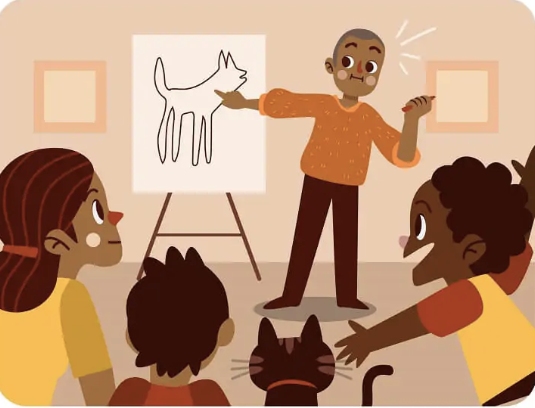
Material Required: Pictionary Junior cards
Age: 5 to 10 years
Pictionary is one of the most fun classroom vocabulary games, so everyone knows how to play it. However, you have to improvise a bit to use it to improve the vocabulary of your class. For this, you have to order some Pictionary Junior cards and divide your class into two groups.
How to Play:
- Call a member from each team and give them a cue from your Pictionary Junior cards.
- Give a chalkboard or marker to draw a clue to guess the word on the chalkboard or on a sheet of white paper so the entire class can see the clues.
Rules:
If the team member guessed the word, they would get one point. If the other team member guessed the word, they would get the point.
Rewards: 10 minutes longer lunch break.
5. Go Fish Vocabulary
Material Required: Go Fish Vocabulary cards
Age: 3 to 15 years
This is one of the best vocabulary games for students if you want to organize a vocabulary game competition with other classes or grade students. You have to first get Go Fish Vocabulary cards.
How to Play:
- Select the ten-word cards matching your students’ vocabulary level.
- Then, you can divide your class into groups and assign them cards based on the number of groups you have created.
- The fun part is that when a student asks for the card, they don’t say the word. Instead, they define the word that the other person has to guess.
Rules:
- Nobody will say the word mentioned on the card.
Rewards: Anything you find appropriate
6. Memory Cards
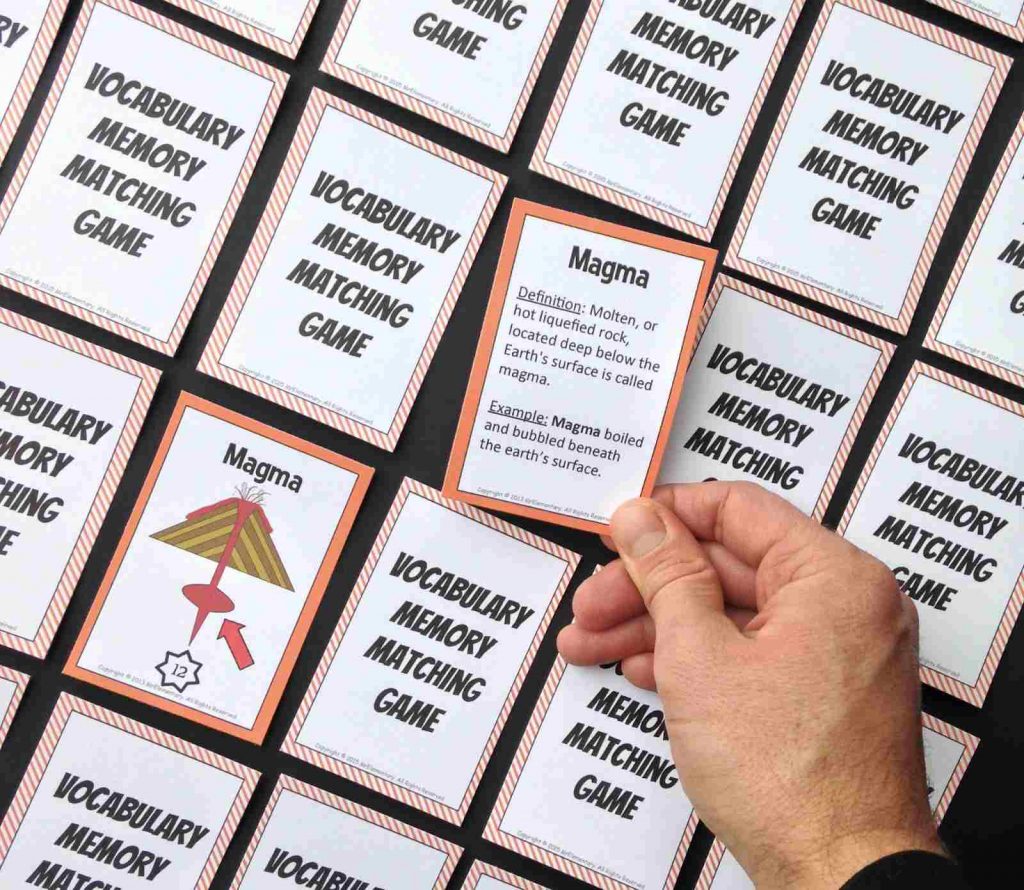
Material Required: Memory cards
Age: 3 to 12 years
This is a simple card-matching game. However, instead of matching things on the cards, students must match words with their definitions. You can order word memory cards online or create appropriate ones for your students’ vocab level.
How to Play:
- Divide your class into small groups.
- Lay down all definition cards on a table in the center of the classroom.
- Give a word card to each team member and ask them to find the correct definition cards from the table.
Rules:
- Give the students 2 minutes to match the card.
Rewards: Anything you find appropriate
Related Reading: Best Memory Games for Kids to Enhance Cognitive Skills
7. Verb Charades
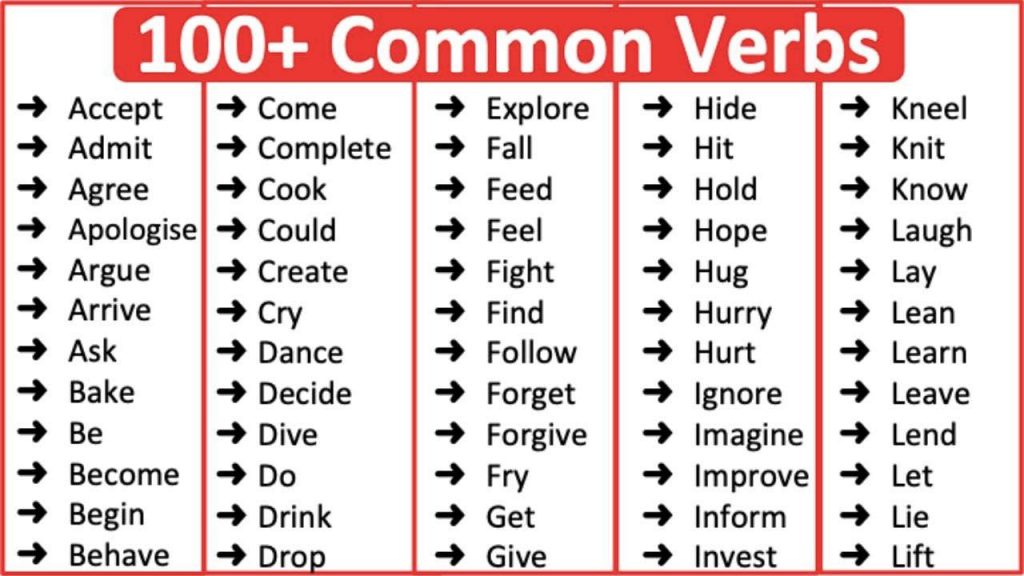
Material Required: Paper slips
Age: 3 to 10 years
It is one of the best English vocabulary games for young students who aren’t good at writing. It is similar to Pictionary, but it has simple verbs that young children can guess faster. Besides this, it involves physical activity to keep children engaged in the game.
How to Play:
- Divide your class into groups.
- You can either write a verb on a piece of paper or say it in a student’s ear such that no one else can hear what you have said.
- Then, ask the student to act so that other team members can guess the verb.
Rules:
- No speaking while acting the word.
Rewards: One point for the right guess
Related Reading: Great Charades for Kids of All Ages
8. Word Association

Material Required: Nothing
Age: 3 and above
It is the best word game for classrooms. Teachers need nothing to play this game, so it is suitable to organize impromptu game sessions.
How to Play:
- Divide your team into two groups.
- A player from a team will say a word.
- Other team players will respond with the word that first comes to their minds.
- It continues until one player repeats a word or pauses too long.
Rules:
- Prompt replies.
Rewards: A whole team gets no homework for a day.
9. Vocabulary Hangman
Material Required: Chalkboard
Age: 8 to 12 years
Transforming the classic ESL vocabulary games of Hangman into a worksheet-based game, this version utilizes fill-in-the-blanks worksheets to teach challenging vocabulary to kids, such as “razzmatazz” or “shenanigans”. This approach ensures a focus on learning and understanding new words without the need for a chalkboard or online virtual whiteboard.
How to Play:
- Print worksheets with sentences featuring blanks corresponding to vocabulary words.
- Give clues or definitions for words instead of guessing letters. Players fill in blanks based on these clues.
- Players work individually or take turns to solve puzzles, earning points for correct words.
Rules:
- Progress by filling blanks with correct words from clues. Hints allowed with point penalties.
Rewards:
- Points for correct fills, with bonuses for speed and minimal hints, encouraging quick, accurate vocabulary use.
Here are some worksheets featuring fill-in-the-blanks that you can print:
Related Reading: Best Puzzles For Kids Of All Ages
Why Play Fun Vocabulary Games With Kids?
Playing word games in your classroom or home is not only entertaining, it can also improve kids’ learning, thinking, and cognitive abilities. Thus, playing vocabulary building games and language games will have the following benefits:
1. Master a Language
The obvious benefit of playing fun vocabulary games is learning a language better. Through vocab games, children learn many new words they might never know otherwise.
Moreover, they can learn the correct word usage in a sentence. The rich vocabulary also allows kids to express their thoughts in written and verbal ways.
Related Reading: How To Make Simple Sentences For Kids
2. Improve Spelling
Vocabulary practice games will not only help to teach new words but also improve kids’ spelling and grammar skills.
For example, games like Scrabble and doing crosswords can improve spelling. These games also help kids understand the words’ real meanings and where they can use them in the real world.
Related Reading: Best Spelling Games for Kids
3. Improve Concentration
It requires concentration to play games. So, when kids focus on finding new words in the dictionary, they will learn to focus on a task. This can help them in other parts of learning as well.
Related Reading: Best Concentration Games for Kids to Improve their Focus
4. Develop Cognitive Skills
Language games put your brain muscles to work. Even when playing fun games like Rolling Words, you use your brain to identify the right word to complete the sentence.
So, when you put your kids’ brains to work, it will improve their cognitive skills. They learn to process information faster and find solutions without your help.
5. Sharpen Memory
While playing word games, kids also put pressure on their memory. They must dig into their memory lane to find the right word definitions, spellings, and sentences to win the game.
Moreover, most word games are strategic and time-bound. When a player recalls information with a clear goal, it makes it easy to organize and remember things.
6. Healthy Competition
Games always ripple a competitive vibe. Players will not only compete with their opponents but also compete with themselves. The competition can motivate kids to improve their vocabulary and learn new words to win classroom games.
7. Self-Satisfaction
Scoring high in word games improves the confidence level in kids. As a result, they feel more satisfied with themselves. This confidence booster can also help them grow in other academic areas.
Related Reading: Amazing Writing Prompt For Kids To Improve Confidence
Vocabulary Games For The Win!

Children enjoy playing games. When you devote time to game-based or play-based learning, your child will develop critical thinking skills, motivation, and goal-setting abilities. As they play games that improve vocabulary and literacy, their confidence will also grow.
Want more ideas to inspire your child to enjoy learning? Then, checkout SplashLearn Reading Games! These animated and fun online games will improve your kids’ vocabulary skills.
Related Reading: Best Grammar Games for Kids That are Super Fun!
Frequently Asked Questions (FAQs)
When does a child begin to develop vocabulary and language skills?
Your child may know and use 20–100 meaningful words by eighteen months. Every day, you’ll notice your child using new words. Around the age of two, your child will begin to combine two words, such as “mummy car” or “I go.”
How can good vocabulary help children in life?
A large vocabulary helps with all aspects of communication, including listening, speaking, reading, and writing. Vocabulary is important for a child’s success for the following reasons: Vocabulary development is directly related to academic achievement. For example, in kindergarten, the size of a child’s vocabulary predicts their ability to learn to read.
What are some fun vocabulary games for elementary students?
Some of the best vocabulary games for elementary students include crossword search, online vocabulary games, and pictionary.

















